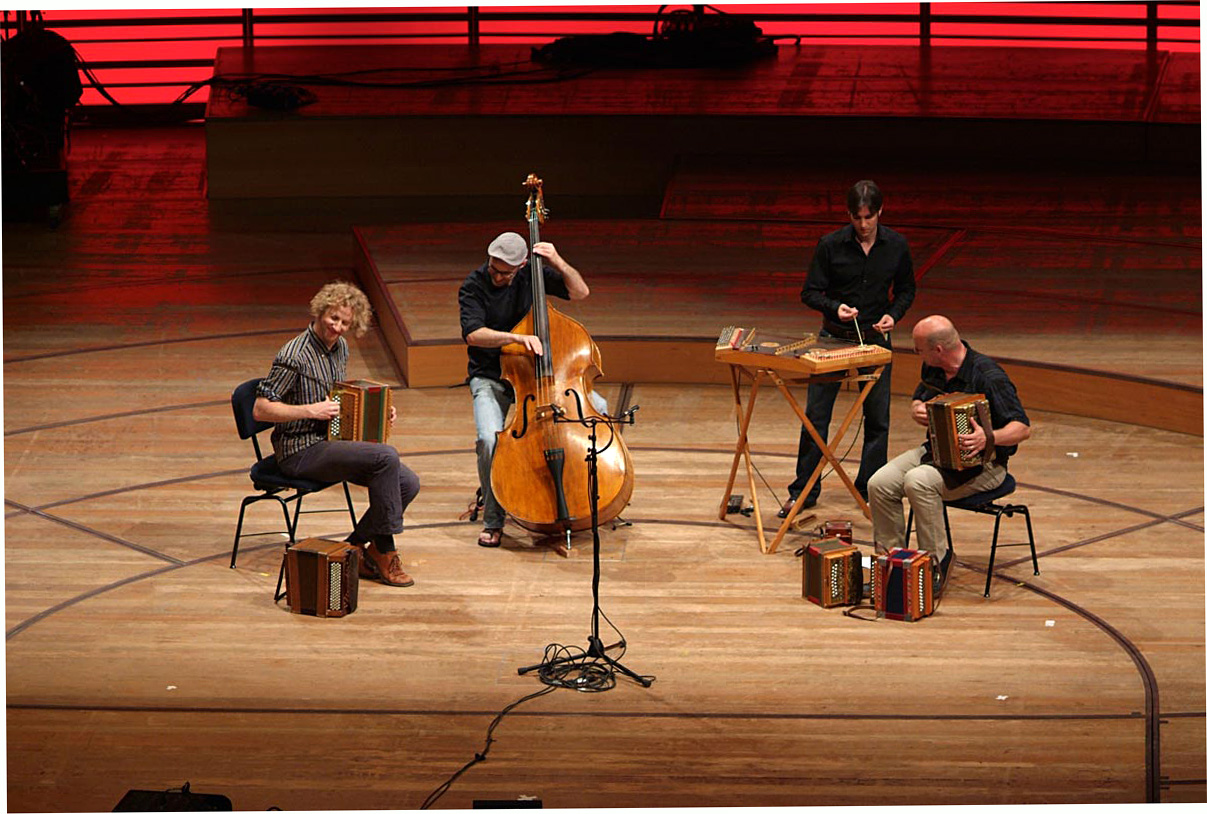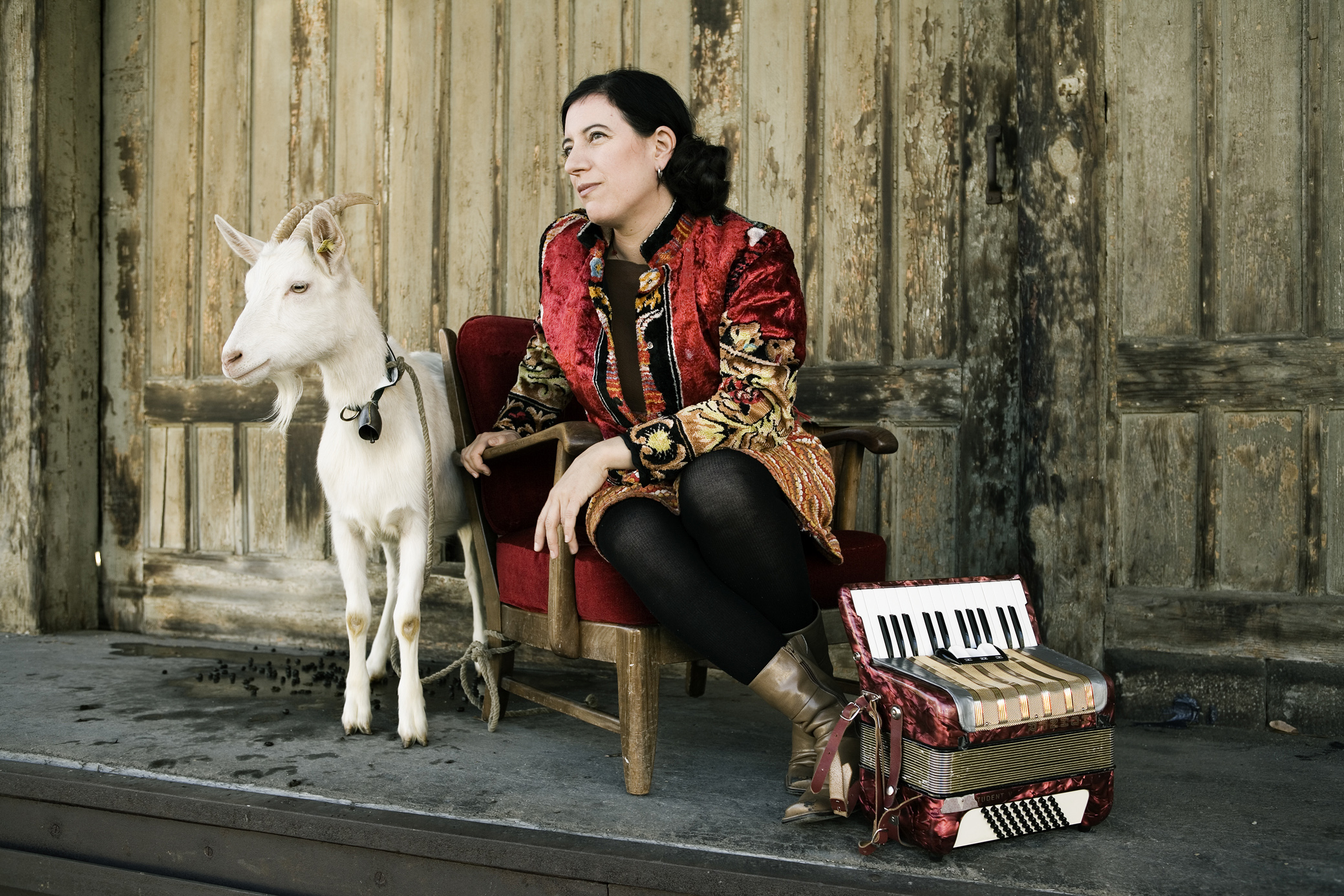Breaking the mould as a Swiss yodeller

Yodeller Nadja Räss exemplifies today’s crossover Swiss folk music scene, and is equally happy experimenting in jazz, listening to 100-year-old yodel recordings or teaching CEOs how to communicate.
Räss bases her work in tradition while also creating her own yodelling styles. She tells swissinfo.ch that Swiss folk music is undergoing changes, from children learning how to yodel in camps to a shift among the public and musicians to explore their roots.
Music should have an “openness” to technology and between genres and even towards going back to historical recordings to learn new “old” forms of singing, she says.
swissinfo.ch: Looking back over the past 100 years of Swiss folk music where are we now?
N.R.: When I heard old recordings of yodelling, 80 or 90 years ago, they had really open vowels, they used really different vowels. Then people set up the yodelling federation and made some rules, too many rules. But now there are a lot of young people in this organisation and it is changing. But it’s true that it is changing really, really slowly. Because of that I don’t think that in five years everyone will be listening to folk music. Some people like it, some don’t. It’s like classical, jazz.

More
Instrument unites traditional and techno
swissinfo.ch: In some ways these rules set the scene back and imposed a structure which meant there wasn’t much creativity…
There were about 60-70 years with all these rules and that’s a little sad. I think we are now heading in a good direction. There is a traditional way to make folk music and a possibility of a freer use of folk music.
swissinfo.ch: In the past yodelling had something of an old-fashioned image as its target audience was more rural with perhaps a conservative understanding of music. Do you think it has changed since?
N.R.: I think it has really changed. Now it is really trendy. The public is younger than in the past. It think that’s because people in Switzerland are going back to their roots more. And not only in music.
swissinfo.ch: A sign of this returning to roots is that you offer yodelling courses for companies and individuals and help run children’s yodelling camps. What are participants looking for and what do you want to convey to them?
N.R.: The older participants want a personal experience. It’s something they are doing for themselves. In the children’s courses it’s really interesting to see children do it like a pop song. Sometimes the children don’t know folk music because their parents don’t like it. But these children come and like to yodel and like to sing folk songs.
Yodelling began as a means of communication between neighbours who lived peaks apart. Originally the art form was known as Juchzin, short yells with different meanings such as “time for tea” or “we’re on our way”.
Yodelling is a warbling song form, characterised by a constant alternating between chest and head voices. In Switzerland, a distinction is made between a shrill yodel, starting in the upper reaches of the voice and descending in the same breath, and Naturjodel, in which one or more voices sing a melody without lyrics. These natural yodels are passed down through families but they are in danger of dying out along with the older generation.
swissinfo.ch: What kind of companies take part?
N.R.: Different companies. I have managers who spend a lot of time at the computer and never speak to other people. Yodelling is also a form of communication. I do a lot of this, for managers, for CEOs of banks. Normally with professions that work more in the office than outside with nature, or with their hands.
swissinfo.ch: Where do you see the Swiss folk music scene heading? More crossover, more back to the roots?
N.R.: I think there are both. I know a lot of crossover folk musicians but most of them are also traditional. It’s interesting to be a musician if you can do both. To do this crossover it is very important to know the roots very well. A tree without roots can’t grow.

More
Folk musicians seek inspiration beyond the norm
swissinfo.ch: Today’s innovative yodel musicians use equipment such as high-tech microphones, loop machines and voice machines and take elements from rock, blues and world music. Can this spell the end of traditional yodelling in Switzerland?
N.R.: No. it’s really important for yodelling to also have this mix. For me, I don’t like to put music into such boxes. I think that’s the interesting thing in each kind of music, to try and make it different. I like to play with the guitar, clarinet, with different instruments, styles. Because of that I think a lot of people know folk music and yodelling. If people go to a jazz concert and if there is any yodelling in the concert, next time perhaps they will go to a traditional yodelling concert. It’s very important for music to have this openness.
swissinfo.ch: Your 2012 CD, “Joolerei – Eine Jodelreise mit Nadja Räss”, includes recordings of various musicians and shows how varied Swiss folk music is today. What is striking is the performers’ technical skills. Can this still be called ‘real’ folk music?
N.R.: Not all of the pieces on this CD can be called traditional. I use my voice as a yodel instrument but sometimes the melodies aren’t very traditional. So perhaps when a piece uses strings or drums, these are not traditional melodies but the technique I use to sing is really the traditional way of singing.

In compliance with the JTI standards
More: SWI swissinfo.ch certified by the Journalism Trust Initiative











You can find an overview of ongoing debates with our journalists here . Please join us!
If you want to start a conversation about a topic raised in this article or want to report factual errors, email us at english@swissinfo.ch.